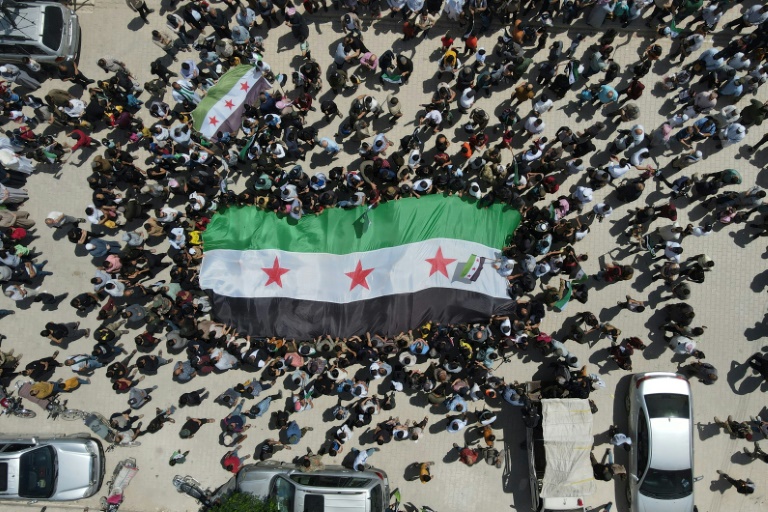Syrians in rebel-held north protest Assad’s return to Arab League

Syrian anti-government protesters unfurl a large opposition flag at a demonstration in the city of Afrin, in the rebel-held northern Aleppo province, to denounce President Bashar al-Assad’s participation at an Arab League summit in Saudi Arabia
Azaz – Hundreds protested in rebel-held northern Syria on Friday against President Bashar al-Assad’s participation in the Arab League summit in Saudi Arabia after a more than decade-long suspension, AFP correspondents said.
“The people want the fall of the regime,” chanted demonstrators in Azaz — one of the main slogans from the waves of peaceful protests that broke out in Syria in 2011.
“Syria cannot be represented by Assad the criminal,” read a banner at the protest in the town, which is under the control of pro-Turkish groups.
Anti-Assad protests took part in other rebel-held areas, including in the northern city of Afrin where a crowd held up a large flag opposition flag.
Assad on Friday was attending his first Arab League summit since the body suspended Syria in late 2011 over the brutal crackdown on pro-democracy demonstrators that led to civil war.
More than half a million people have been killed and around half of the country’s pre-war population has been forced from their homes due to the conflict.
“We call on the Arab peoples to put pressure on their governments to go back on the decision (to re-admit Syria) and for Bashar al-Assad to leave,” said Issam Khatib, a lawyer originally from the northern city of Aleppo.
Assad had been politically isolated in the region since the war began, but a devastating February 6 earthquake that killed thousands in Turkey and Syria sparked Arab outreach.
A flurry of diplomatic activity has been underway in recent weeks as Middle East rivals Saudi Arabia and the Syrian government’s ally Iran patched up ties, shifting regional relations.
The regional detente with Damascus is a heavy blow to Syria’s political and armed opposition, which received Arab support particularly in the conflict’s early stages.
Damascus now controls most of Syria, after clawing back much of the ground it had lost with the crucial support of allies Iran and Russia.
The shattered country is at the mercy of foreign powers, with Russian, Iranian, Turkish and American forces all present.
The rebel-held areas of Syria’s north and northwest, controlled by Islamist groups and Turkish-backed fighters, are home to more than four million people, at least half of whom have been displaced from other parts of the country.
